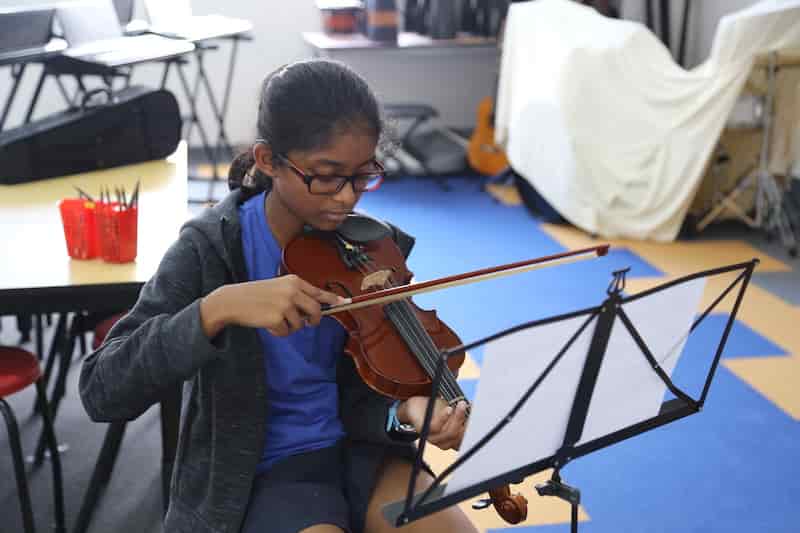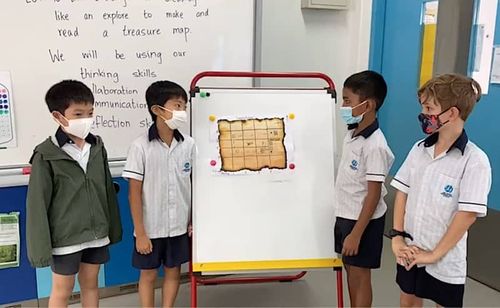At OWIS, we aim to offer a rich, enjoyable and lasting learning experience that not only supports our students’ academic growth but also helps them develop as responsible, global citizens. We also know that a child’s learning is not limited to the classroom. The activities children engage in outside the classroom are a vital and complementary component to their school-based learning.
William R., who has children studying in primary and secondary at OWIS, says, “All our five children have been attending OWIS Nanyang since January 2018. They have a mix of interests in the arts and sports. They’re also enjoying Maths, Geography and Mandarin. Most mornings, they’re so keen to go to the school that they request that we leave home early!”

Co-curricular activities teach children how to be self-directed learners, building confidence and resilience. Most importantly, the activities that students explore as young children can develop into lifelong passions, providing great personal fulfillment. Teaching children to take the opportunity to try new experiences is extremely important to us and that is why we always offer a wide range of co-curricular activities, encouraging our students to try things that may typically fall outside of their comfort zone.
How Co-curricular Activities Support Learning and Personal Growth
A co-curricular activity is any hobby, sport, musical lesson or cultural activity that a child is interested in undertaking outside of traditional academic study. These activities can be serious or playful, technical or simple, ranging from arts and crafts to music to sports to computer games. They may require quiet time, physical exertion or mental input.
For example, children who are passionate about music may enjoy taking singing or instrument lessons. Children can find an outlet for their creativity by participating in painting, writing, ceramics or jewellery-making workshops. Children who enjoy sports may benefit from playing in an organised competitive association, like a football league, or they may enjoy taking lessons in other physical activities like swimming or judo. They often find sports or activities that they have not tried before and subsequently become passionate about. This physical exertion and stimulation helps to keep children healthy. Children can also develop social skills and critical thinking through popular online collaborative games, like Minecraft.
In the case of some fine and performing arts co-curricular activities, they allow students to dive deeper into a passion they first explore during the school day. By actively engaging in direct, hands-on experiences, children gain a deeper understanding from the hobby than they would from simply reading a book or studying about the topic. This invaluable experience helps students explore, discover and learn new skills at their own pace. It also teaches them to be both team players, as well as be able to work independently, depending on which hobbies they choose. Team working is a particularly important life skill as it will be essential throughout their careers. Alongside this, the ability to work independently is just as fundamental for future success.
Hobbies help children learn in three important ways. First, children must master the fundamental skills to be successful at the hobby, such as learning how to knit, fence or play an instrument. Second, since hobbies are explored outside a structured academic setting, children must learn how to be independent and self-directed. Doing so builds confidence and resilience and helps achieve self-directed goals. Finally, solo hobbies help children build independence and problem solving skills while group hobbies teach children camaraderie, cooperation and collaboration.
Teachers encourage students to explore a range of activities so that they can gain a holistic set of skills. These activities are also a good outlet for relieving any stresses from daily life and to have some down time. Most importantly, hobbies and interests are an important aspect in helping children become well rounded individuals. The opportunities to partake in these hobbies helps to ignite their passion for learning and improving their knowledge and skills.
Encouraging Co-curricular Activity Selection
The most successful hobbies are those that are self-directed. Children will naturally be inclined to pursue activities that interest them. Educators and parents must allow students the freedom to explore a range of hobbies as they grow and their interests mature. If a student does not show a natural proclivity towards any particular hobby, parents may offer the student guidance. However, it is important that students feel a sense of ownership over the hobby selection, process and overall experience – driving a passion for continued learning.
At the end of the day if a child is enjoying taking part in a sport or hobby then they should be encouraged to continue. It helps them develop a sense of staying-power and overcome problems. For instance, they may find that their hand eye coordination is not as good as their peers but by spending time practising, such as ball skills in football or basketball for example, they can improve this. This gives them a huge sense of achievement when they have mastered a new tactic by working hard and keeping focussed; it is this determination that will help them succeed in life.
To find out more about the opportunities for Co-Curricular activities at OWIS please do not hesitate to get in touch. We are open to suggestions for new sports and activities, so if there is something that you would like including then please do let us know.
Please contact us for more information, or to book a tour.
(This blog was originally written in collaboration with Ms Claire Andersen, former Head of Music, OWIS Nanyang.)














